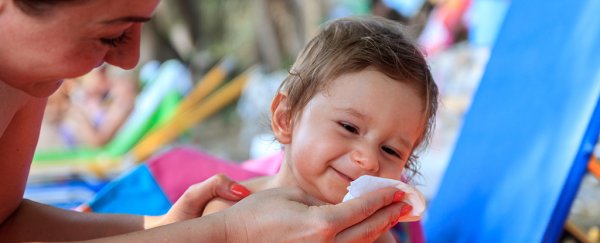How do food allergies get started in babies? Scientists aren't really sure, but a new study in mice shows a complicated combination of factors could be to blame, including our genetic coding, along with exposure to dust, and even baby wipes.
If we can better pin down why these allergies form, we can take steps to prevent them in the first place. Experts have noted a significant rise in the number of people developing allergies in the last couple of decades, so the problem appears to be getting worse.
The new study was carried out by testing allergens, such as peanuts, on mice. It found that exposure to dust and allergens on the skin could eventually trigger allergic reactions, and that anything that breaks down the skin's natural barriers – like the soap in baby wipes – might have an influence.
"This is a recipe for developing food allergy," says lead researcher and allergy-immunology professor Joan Cook-Mills, from Northwestern University in Illinois.
"It's a major advance in our understanding of how food allergy starts early in life."
There's a lot to take in from the research, and it's important to bear in mind that all these various factors are only potential contributors – it's not clear that any of them will definitely trigger food allergies, but it seems as though they might, given the right conditions everywhere else.
One of those conditions is the genetics we're born with: the scientists dug into clinical evidence that show up to 35 percent of children with food allergies also have atopic dermatitis - a type of eczema. In these cases, gene mutations cause the skin barrier to break down in places.
Cook-Mills and her team bred mice with similar genetic mutations, then exposed them to various allergens to try and work out why this eczema might be linked to developing food allergies.
Nothing had an effect until the mice were regularly exposed to food and dust allergens over the course of two weeks at a young age. After that, allergic reactions could be triggered by feeding the animals egg or peanut – and before any outward signs of atopic dermatitis had appeared in the mice.
"I thought about what are babies exposed to," says Cook-Mills. "They are exposed to environmental allergens in dust in a home. They may not be eating food allergens as a newborn, but they are getting them on their skin.
"Say a sibling with peanut butter on her face kisses the baby. Or a parent is preparing food with peanuts and then handles the baby."
In other words, skin exposure, on top of genetics, could be a key trigger. As for baby wipes, some of them contain a soap ingredient called sodium lauryl sulphate (SLS), which can linger on the skin and break down its naturally protective fatty barrier.
Considering not all baby wipe brands contain SLS, and this is only a limited study on mice, it's too early for a worldwide ban on cleaning up your toddler with these handy things.
But these are definitely worthwhile and interesting findings that could be used as a basis for research on human infants.
And it all feeds into other research – previous studies have suggested that exposure to peanut proteins in the household dust could trigger allergies. Gradually, the picture is becoming a little more clear.
For now, the researchers are saying that washing your hands before handling your baby, limiting the use of baby wipes, and washing baby wipe soap off with water could help reduce the risk of allergies developing.
Up to 6 percent of kids in the US develop food allergies, according to the latest statistics, and at the moment there's no cure – it's simply a case of trying to avoid those allergens for the rest of your life. Let's hope the new research might one day help experts determine exactly how these reactions get started.
"More studies are needed in humans to examine mechanisms for development of food allergy and mechanisms for induction of tolerance to food allergens early in life", conclude the researchers.
The research has been published in the Journal of Allergy and Clinical Immunology.
